Kwanzaa 🕯 Celebration
Umoja (Unity): To strive for and to maintain unity in the family, community, nation, and race.
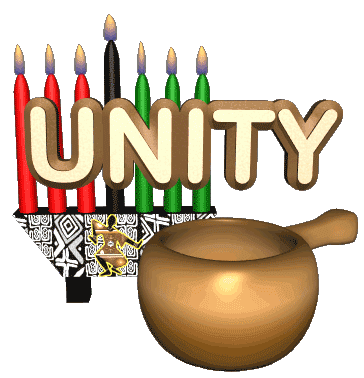
Kujichagulia (Self-Determination): To define ourselves, name ourselves, create for ourselves, and speak for ourselves.
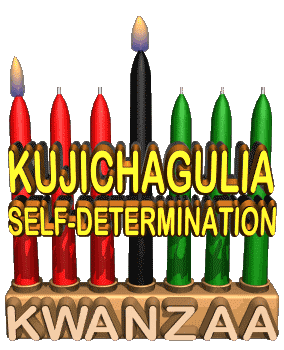
Ujima (Collective Work and Responsibility): To build and
maintain our community together and make our brothers’ and sisters’
problems our problems, and to solve them together.
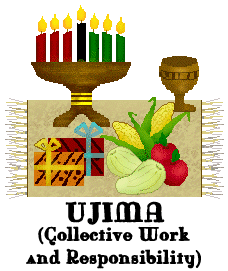
Ujaama (Cooperative Economics): To build and maintain our own stores, shops, and other businesses and to profit from them together.
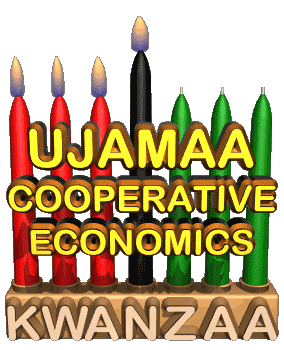
Nia (Purpose): To make our collective vocation the building
and developing of our community in order to restore our people to their
traditional greatness.
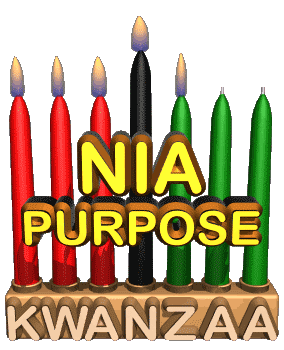
Kuumba (Creativity): To do always as much as we can, in the
way we can, in order to leave our community more beautiful and
beneficial than we inherited it.
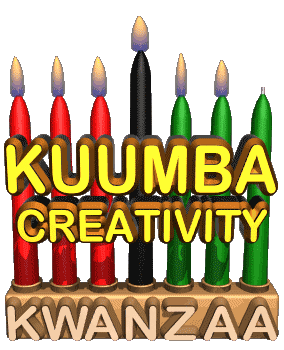
Imani (Faith): To believe with all our hearts in our people,
our parents, our teachers, our leaders, and the righteousness and
victory of our struggle.
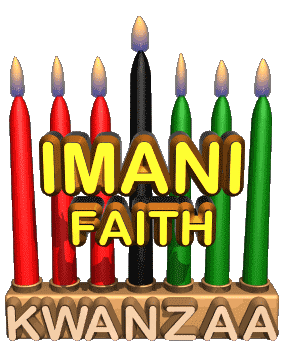
Kwanzaa Celebration
👇 👇
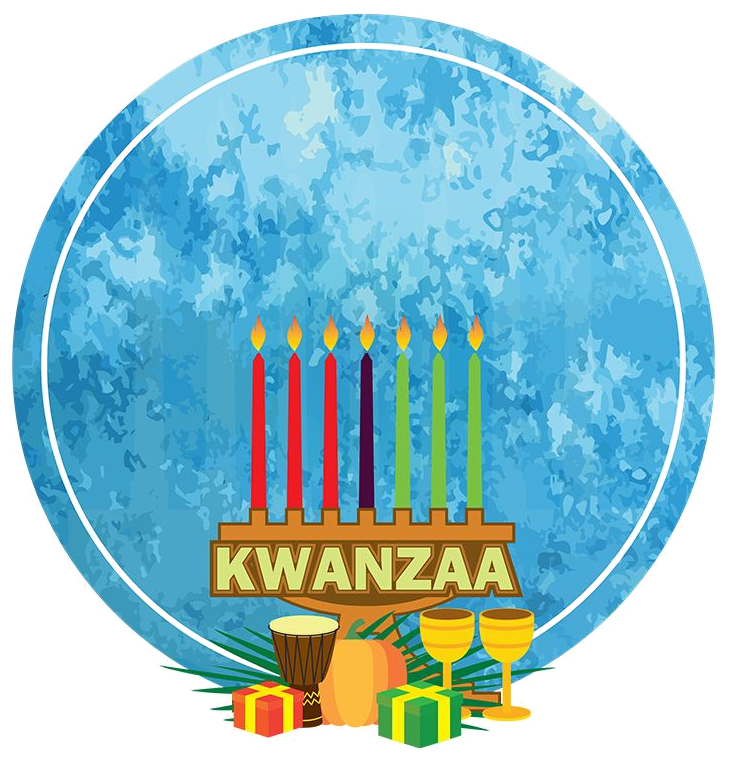
Celebrating Kwanzaa
Definition & Celebration Of Kwanzaa
Kwanzaa is a unique African American celebration with focus on the traditional African values of family, community responsibility, commerce, and self-improvement.
🕯
Kwanzaa is neither political nor religious and despite some misconceptions, is not a substitute for Christmas. It is simply a time of reaffirming African-American people, their ancestors and culture.
🕯
Kwanzaa, which means "first fruits of the harvest" in the African language Kiswahili, has gained tremendous acceptance. Since its founding in 1966 by Dr. Maulana Karenga, Kwanzaa has come to be observed by more than18 million people worldwide, as reported by the New York Times. When establishing Kwanzaa in 1966, Dr. Karenga included an additional "a" to the end of the spelling to reflect the difference between the African American celebration (kwanzaa) and the Motherland spelling (kwanza).
🕯
Kwanzaa is based on the Nguzo Saba (seven guiding principles), one for each day of the observance, and is celebrated from December 26th to January 1st.
🕯
Umoja (oo-MO-jah) Unity stresses the importance of togetherness for the family and the community, which is reflected in the African saying, "I am We," or "I am because We are." Black candle is lit.
🕯
Kujichagulia (koo-gee-cha-goo-LEE-yah) Self-Determination requires that we define our common interests and make decisions that are in the best interest of our family and community. Red candle next to black candle is lit.
🕯
Ujima (oo-GEE-mah) Collective Work and Responsibility reminds us of our obligation to the past, present and future, and that we have a role to play in the community, society, and world. Green candle next to black candle is lit.
🕯
Ujamaa (oo-JAH-mah) Cooperative economics emphasizes our collective economic strength and encourages us to meet common needs through mutual support. Middle red candle is lit.
🕯
Nia (NEE-yah) Purpose encourages us to look within ourselves and to set personal goals that are beneficial to the community. Middle green candle is lit.
🕯
Kuumba (koo-OOM-bah) Creativity makes use of our creative energies to build and maintain a strong and vibrant community. Last red candle is lit.
🕯
Imani (ee-MAH-nee) Faith focuses on honoring the best of our traditions, draws upon the best in ourselves, and helps us strive for a higher level of life for humankind, by affirming our self-worth and confidence in our ability to succeed and triumph in righteous struggle. Last green candle is lit.
🕯
Kwanzaa is neither political nor religious and despite some misconceptions, is not a substitute for Christmas. It is simply a time of reaffirming African-American people, their ancestors and culture.
🕯
Kwanzaa, which means "first fruits of the harvest" in the African language Kiswahili, has gained tremendous acceptance. Since its founding in 1966 by Dr. Maulana Karenga, Kwanzaa has come to be observed by more than18 million people worldwide, as reported by the New York Times. When establishing Kwanzaa in 1966, Dr. Karenga included an additional "a" to the end of the spelling to reflect the difference between the African American celebration (kwanzaa) and the Motherland spelling (kwanza).
🕯
Kwanzaa is based on the Nguzo Saba (seven guiding principles), one for each day of the observance, and is celebrated from December 26th to January 1st.
🕯
Umoja (oo-MO-jah) Unity stresses the importance of togetherness for the family and the community, which is reflected in the African saying, "I am We," or "I am because We are." Black candle is lit.
🕯
Kujichagulia (koo-gee-cha-goo-LEE-yah) Self-Determination requires that we define our common interests and make decisions that are in the best interest of our family and community. Red candle next to black candle is lit.
🕯
Ujima (oo-GEE-mah) Collective Work and Responsibility reminds us of our obligation to the past, present and future, and that we have a role to play in the community, society, and world. Green candle next to black candle is lit.
🕯
Ujamaa (oo-JAH-mah) Cooperative economics emphasizes our collective economic strength and encourages us to meet common needs through mutual support. Middle red candle is lit.
🕯
Nia (NEE-yah) Purpose encourages us to look within ourselves and to set personal goals that are beneficial to the community. Middle green candle is lit.
🕯
Kuumba (koo-OOM-bah) Creativity makes use of our creative energies to build and maintain a strong and vibrant community. Last red candle is lit.
🕯
Imani (ee-MAH-nee) Faith focuses on honoring the best of our traditions, draws upon the best in ourselves, and helps us strive for a higher level of life for humankind, by affirming our self-worth and confidence in our ability to succeed and triumph in righteous struggle. Last green candle is lit.

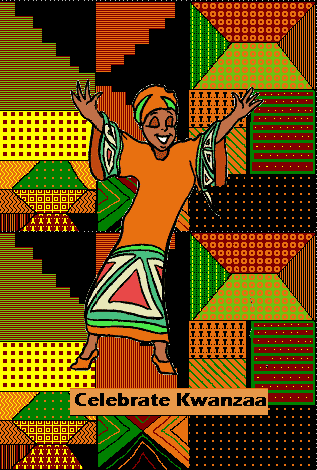
fish food for thought
Black, female college student with opinions regarding race, gender and education
👇


No comments:
Post a Comment